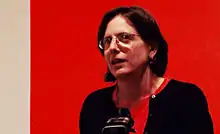Judith Berman
Judith Berman (born 1958[1]) is an American anthropologist and writer of science fiction and fantasy. and She grew up in Moscow, Idaho, and throughout her childhood consumed Golden Age science fiction.[2] Berman began writing and making up her own stories around the age of five or six.[3] She attended Bennington College in Vermont, where she majored in Anthropology, Russian, and comparative literature and graduated in 1979.[3] By training, she is a linguistic anthropologist and has published articles on Native American myth and translations, in particular those of the Pacific Northwest. After working as an editorial assistant at W.W. Norton, she began her graduate work at the University of Pennsylvania where she obtained her Ph.D. in anthropology (1991).[3] She also worked as a research associate at the University of Pennsylvania Museum of Archaeology and Anthropology (2005).[3] She currently resides in Victoria, British Columbia (2013) with her husband John Holland and their son Sam (born 1999).[3] She also has a form of synesthesia.[4]

Science fiction
Her science fiction and fantasy has occasionally drawn on her anthropological background. Her first novel, "Bear Daughter" (2005) made use of this in part and was nominated for the Crawford Award. This novel was inspired by Native American stories, but not about real Indians, past or present. It is inspired by the indigenous traditions of the north Pacific coast. The novel is fundamentally about her own personal concerns, however she wanted to be as true as possible to worldviews that were contained in the indigenous sources.[2] In her acknowledgments, she thanks various cultures in their own language for their contribution: Gunalchéesh (Tlingit), Hàw’aa (Haida), T'ooyaksiy nisim (Nisga), T'ooyaxsiy nisim, N t'oyaxsasm, Analhzaqwnugwutla, Giáxsia, Gianakasi, Stutwinii (Nuxalk Nation), Gelakas’la (Gwa'sala people) and Tl'eekoo (Huu-ay-aht First Nations). Berman's fiction has been short listed for the Nebula, the Sturgeon, and Crawford Awards. She has also won a Pioneer Award (SFRA Pioneer Award [5]) from the Science and Fiction research Association for her 2001 essay, “Science Fiction Without the Future,” for the best critical length essay of its year. Her short fiction has also appeared in Asimov’s, Interzone, Realms of Fantasy, and Black Gate.[2]
A list of Berman's short stories and other works:
- “The Year of Storms” 1995
- “Lord Stink” 1997
- “The Window” 1999 –third place Sturgeon winner
- “Dream of Rain” 2000
- “The Fear Gun” 2004 –the 2005 Sturgeon finalist
- “The Poison Well” 2004
- Chapbook, “Lord Stink and Other Stories” appeared from Small Beer Press in 2002.[3]
- "Awakening" 2008 -nominated for a Nebula Award for Best Novella.[6]
Linguistic anthropology
Berman is a linguistic anthropologist by training and has published in a number of venues on Native American myth and translation.[2] She specializes in oral literature, ethnohistory, and history or ethnographic research on the North West Coast, with a particular focus on the lives and work of indigenous ethnographers George Hunt and Louis Shotridge.[7] She has worked as a research associate at the University of Pennsylvania Museum of Archaeology and Anthropology (2005) [3] and is now at the University of Victoria School of Environmental Studies and adjunct in its Anthropology Department (2013-2016) where her research interests are in Northwest Coast oral literature and ethnohistory and is a Franz Boas scholar.[7] Cultural appropriation is any general instance of cross-cultural borrowing. Sometimes cultural appropriation is respectful, representing progress and amicable trade. In other instances, it can be a disservice to a culture and its members by "borrowing" or manipulating an aspect of the culture without respecting the significance it holds for the people whom it belongs too. Berman discusses the idea of cultural appropriation and her thoughts on the topic in her interview with Strange Horizons. Berman has also published a book on "Clausal Syntax of German" as well as a short story called "The Culture as it Appears to the Indian Himself" in History of Anthropology Volume 8, Volksgeist As Method and Ethic, Essays on Boasian Ethnography and the Germ Anthropological Tradition.
References
- Date information sourced from Library of Congress Authorities data, via corresponding WorldCat Identities linked authority file (LAF).
- Berman, Judith. "Science Fiction Without the Future". Strange Horizons. Archived from the original on 6 March 2016. Retrieved 17 February 2016.
- "Judith Berman: Zombies and Spaceships". Locus. August 2005.
- Interview at Strange Horizons Archived 2008-03-24 at the Wayback Machine
- "Science Fiction Research Association - Home". www.sfra.org.
- Locus Index to SF Awards Archived 2007-09-02 at the Wayback Machine
- "Franz Boas Papers: Documentary Edition". Western University: Social Science.